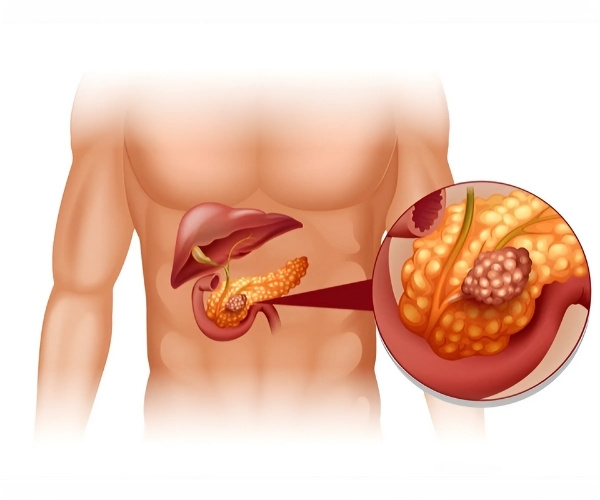Dr. Nitin Singhal
Pancreatic Cancer Surgeon In Ahmedabad, India
About Us
Dr. Nitin Singhal: Best Pancreatic Cancer Treatment in Ahmedabad
Dr Nitin Singhal is a robotic and HIPEC surgeon with 15+ years of experience and more than 5,000 successful major cancer surgeries. He is a pioneer in the management of gastrointestinal, gynaecological, and urological malignancies, with advanced expertise in robotic surgery and HIPEC procedures.
When it comes to the best pancreatic cancer treatment in Ahmedabad, Dr Singhal offers world-class care with a focus on precision, advanced technology, and patient-centred outcomes. His approach ensures not only accurate removal of cancer but also faster recovery and improved quality of life.
In cancer care, you need a surgeon who combines high-level expertise with compassion and respect. Dr Nitin Singhal stands out for his ability to deliver exceptional surgical outcomes while supporting patients and families throughout their journey.
What is Pancreas Cancer?
Pancreatic cancer is a serious disease that develops in the tissues of the pancreas, an organ located behind the stomach that helps with digestion and blood sugar control. The most common type is pancreatic ductal adenocarcinoma, which often goes unnoticed in its early stages because symptoms such as abdominal pain, jaundice, unexplained weight loss, or loss of appetite appear only when the disease has progressed. Early diagnosis is challenging but extremely important, as it greatly impacts the success of treatment.
Pancreatic Cancer Treatment in Ahmedabad includes advanced options like surgery, chemotherapy, radiation therapy, targeted therapy, and robotic-assisted procedures. Surgical treatments such as the Whipple procedure or distal pancreatectomy can be curative if the cancer is detected early. With cutting-edge facilities and expert cancer surgeons, patients can benefit from minimally invasive robotic surgeries that ensure precise tumor removal, quicker recovery, and improved outcomes. A multidisciplinary approach combining technology and compassionate care makes treatment more effective and patient-focused.

Happy Clients
Successful Surgeries
Patients Reviews Rate
Years of Experience
Types of Pancreas Cancer Surgery

Whipple Procedure
The Whipple procedure is the most common surgery for pancreatic cancer in the head of the pancreas. It removes the affected pancreas part along with nearby organs, then reconnects the digestive tract.

Distal Pancreatectomy
Distal pancreatectomy is used when the cancer is located in the body or tail of the pancreas. The surgeon removes the affected portion of the pancreas, often along with the spleen.

Total Pancreatectomy
Involves removing the entire pancreas along with parts of the stomach, small intestine, bile duct, gallbladder, and sometimes the spleen. Although less common, it may be needed for widespread disease.

Palliative Surgery
Your Guide to Pancreas Cancer
Pancreatic cancer risk is influenced by several lifestyle and genetic factors. Smoking, chronic alcohol consumption, obesity, and a diet high in processed meats or fats are known to increase chances. Long-standing medical conditions such as chronic pancreatitis, diabetes, and family history of pancreatic cancer also play a major role.
Age (especially above 60), exposure to certain workplace chemicals, and genetic mutations (like BRCA1, BRCA2, or Lynch syndrome) further raise the risk. Understanding these risk factors helps in early monitoring and preventive measures.
Pancreatic cancer often shows vague symptoms in its early stages, which makes detection difficult. Common signs include abdominal or back pain, unexplained weight loss, jaundice (yellowing of skin and eyes), loss of appetite, and dark urine.
As the disease advances, symptoms may worsen to include nausea, digestive difficulties, fatigue, and new-onset diabetes. Because these signs overlap with many other conditions, timely evaluation by a specialist is crucial for diagnosis.
Treatment depends on the stage of cancer, overall health, and tumor location. Surgical options like Whipple procedure, distal pancreatectomy, or total pancreatectomy are considered when the cancer is operable. These aim to remove the tumor completely and restore digestive functions.
For advanced or inoperable cases, chemotherapy, targeted therapy, radiation therapy, or immunotherapy may be used to shrink tumors, control spread, and relieve symptoms. Palliative treatments also play an important role in improving quality of life.
Benefits of Robotic Pancreas Cancer Surgery?

Faster Recovery Time

Low Risk of Infection

Lesser Scars

Less Discomfort After Surgery

Shorter Hospital Stay

Speedier Return to Daily Life
Why Choose Dr Nitin Singhal For Pancreas Cancer Surgery?
Dr. Nitin Singhal is a leading Robotic and HIPEC Cancer Surgeon with 15+ years of experience and 5,000+ successful surgeries. He specializes in a wide range of complex cancer treatments, including GI, thoracic, gynecological, urological, and pancreatic cancers. Known for his precision and compassionate care, he is a trusted name for advanced cancer treatment in Ahmedabad.

Expertise
Dr. Singhal performs advanced surgeries like the Whipple procedure, distal pancreatectomy, and palliative operations, tailored to each patient. His robotic and minimally invasive methods ensure precision, fewer complications, and faster recovery.
Infrastructure
He operates in world-class hospitals with robotic platforms, advanced imaging, and ICUs for maximum safety and comfort. A multidisciplinary team provides complete, seamless cancer care under one roof.
Technology
He operates in world-class hospitals with robotic platforms, advanced imaging, and ICUs for maximum safety and comfort. A multidisciplinary team provides complete, seamless cancer care under one roof.
Commonly Asked Questions
Can you be cured of pancreatic cancer?
Cure for pancreatic cancer depends on the stage at which it is diagnosed. If detected early and surgically removed completely, chances of long-term survival are higher. Unfortunately, many cases are diagnosed late, making cure more difficult. With advanced techniques like robotic surgery and targeted therapies, outcomes are improving. A combination of surgery, chemotherapy, and radiation can offer the best chance of cure.
Is pancreatic surgery painful?
Like any major surgery, pancreatic surgery involves some pain and discomfort during recovery. However, modern surgical methods like minimally invasive and robotic approaches reduce pain significantly. Patients are given strong pain management support, including medications and epidural anesthesia if needed. Within a few days, pain becomes manageable and improves gradually. Rehabilitation and proper care help patients recover faster and with less discomfort.
What is the success rate of pancreas surgery?
The success rate of pancreatic surgery depends on the type of surgery, stage of cancer, and overall patient health. In specialized centers with experienced surgeons, procedures like the Whipple surgery have survival rates that are steadily improving. When performed early, the surgery offers the best chance for long-term survival. Five-year survival rates may range between 20–40% for operable cases. Success also depends on combining surgery with other therapies.The success rate of pancreatic surgery depends on the type of surgery, stage of cancer, and overall patient health. In specialized centers with experienced surgeons, procedures like the Whipple surgery have survival rates that are steadily improving. When performed early, the surgery offers the best chance for long-term survival. Five-year survival rates may range between 20–40% for operable cases. Success also depends on combining surgery with other therapies.
Can you live long without a pancreas?
Yes, it is possible to live without a pancreas, but lifelong medical support is needed. The pancreas produces insulin and digestive enzymes, so their loss affects blood sugar and digestion. Patients require insulin therapy to manage diabetes and enzyme supplements to aid digestion. With proper treatment and lifestyle adjustments, many people live healthy lives after pancreas removal. Regular follow-ups are important for long-term survival.
What happens if the pancreas is removed?
If the pancreas is removed (total pancreatectomy), the body can no longer produce insulin or digestive enzymes naturally. This means the patient develops diabetes and requires insulin for life. They also need enzyme supplements to digest food properly. The surgery is complex but can be lifesaving for certain cancers or severe conditions. With medical care, patients can adapt and live a fulfilling life.
Get In Touch!
We provide a 24*7 emergency care
If you have any kind of robotic cancer surgery-related medical emergency, visit Sterling Hospital. An expert doctor is always available & treatment will be provided at once.

